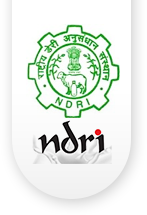Dr. Dhruba Malakar
Principal Scientist
Principal Scientist and Adjunct Professor (Calcutta School of Tropical Medicine) Animal Biotechnology center, National Dairy Research Institute, Karnal-132001, Haryana. Telephone No.0184-2259541(O)9416741839(M).
Email: dhrubamalakar@gmail.com
Current Research Area
In vitro and in vivo production of embryos in and their transfer to recipient animals. Isolation culture and characterization of embryonic stem cell. Somatic cell nuclear transfer in farm animals with micromanipulator based and hand guided. Production, culture and characterization of induced pluripotent stem cells from somatic cells Cloning of therapeutic important genes and production of transferable transgenic embryos for generation of transgenic farm animals.

Qualification:
| Degree | Name of the College/Institute and University | Degree awarded |
| B. V. Sc. & A.H. | Bidhan Chandra Krishi Viswavidyalaya, West Bengal | 1983-1988 |
| M. Sc. (Animal
Biotechnology) |
National Dairy Research Institute, Karnal, India | 1989-1991 |
| Ph. D. (Animal
Biotechnology) |
Indian Veterinary Research Institute, Izatnagar, India. | 1996-2000 |
| Post Doctoral Fellow | Hillman Cancer Centre, University of Pittsburgh, Pennsylvania, USA. | 2007-2008 |
Research:
Production of embryonic stem cells, mesenchymal stem cells, spermatogonial stem cells and iPS cells. Treatment of wound, paralysis, fracture, mastitis, endometritis and cancer of animals using mesenchymal stem cells. Differentiation of stem cells into germ cells. In vitro and in vivo production of blastocysts and their transfer to recipient animals. Somatic cell nuclear transfer in farm animals. Recombinant cloning of therapeutic important genes and production of transferable transgenic embryos. CRISPR/Cas9 mediated gene knock in and knock out for production of transgenic animals. Global Transcriptome profiling of different stages of IVF, somatic cell cloned and parthenogenetic goat embryos.
Teaching:
- BT-612 (Fundamentals of Cell and Molecular Biology) (3+0)
- BT-612 (Animal Tissue culture: Principles and applications) (2+1)
- BT-713 (Advances in Reproductive Biotechnology) (3+0)
- BT-722 (Advances in Animal Tissue culture) (3+0)
Publications:
- Hruda Nanda Malik, Dinesh Kumar Singhal and Dhruba Malakar (2020). Derivation of oocyte-like cells from putative embryonic stem cells and parthenogenetically activated into blastocysts in goat. Scientific Reports, 10:10086 https://doi.org/10.1038/s 41598-020-66609-2
- Ansari, S., Jamwal, S., Saini, S., Singh R. and Malakar D. (2019). Folate-methionine cycle and folate transport in developing buffalo embryos. Reproduction, Fertility and Development 32(2):168-168.
- Singh R., Saini S., Ansari S., Jamwal S. and Malakar D. (2020). Exploring the use of mesenchymal stem cells for treatment of mastitis and metritis in cattle. Reproduction Fertility and Development 32(2):238.
- Arun Kumar De, Perumal Ponraj, Dhruba Malakar, Ramachandran Muthiyan, A. Kundu & Debasis Bhattacharya (2019).Complete mitogenome sequencing of Andaman buffalo: an endangered germplasm of Andaman and Nicobar Islands, India. Journal of Genetics 98. pii: 97.
- De AK, Muthiyan R, Mondal S, Mahanta N, Bhattacharya D, Ponraj P, Muniswamy K, Kundu A, Kundu MS, Sunder J, Karunakaran D, Bera AK, Roy SD and Malakar D. (2019). A Natural Quinazoline Derivative from Marine Sponge Hyrtios erectus Induces Apoptosis of Breast Cancer Cells via ROS Production and Intrinsic or Extrinsic Apoptosis Pathways. Marine Drugs 17: 658. NAAS score- not assign Impact factor: 4.379
- De AK, Muthiyan R, Ponraj P, Muniswamy K., Sunder J, Kundu A, Karunakaran D, George Z, Kundu MS, Ahmed SKZ, Malakar D, and Bhattacharya D (2019). Mitogenome analysis of Indian isolate of Rhipicephalus microplus clade A sensu (Burger et al., 2014): A first report from Maritime South-East Asia. Mitochondrion 49:135–148. NAAS score- not assign Impact factor: 3.449
- De AK, Muthiyan R, George Z, Ponraj, Malakar D, Kundu A, Sunder J and Bhattacharya D (2019). Complete mitochondrial genome of Trinket cattle, a Danish colonial leftover MITOCHONDRIAL DNA PART B 4(1): 2053–2054. NAAS score- not assign Impact factor: 0.561 7
- De AK, Ponraj P, Malakar D, Muthiyan R, Kundu A And Bhattacharya D (2019). Complete mitogenome sequencing of Andaman buffalo: an endangered germplasm of Andaman and Nicobar Islands, India. Journal of Genetics 98:97-105. NAAS score- not assign Impact factor: 0.825
- Ali, SA, Malakar, D, Kaushik, JK, Mohanty AK and Kumar S (2018). Recombinant Purified Buffalo Leukemia Inhibitory Factor Plays an Inhibitory Role in Cell Growth. PLOS ONE, PLoS ONE 13(6): e0198523.
- Kaur G. Ali S.A. Pachauri S. Malakar D. Kaushik J.K. Mohanty A.K. Kumar S. (2017). Buffalo Leukemia Inhibitory Factor Induces Differentiation and Dome-Like Secondary Structures in COS-1 Cells. Cytogenet Genome Res 151:119-130
- Thakur, A. Sharma, V. Aneja, B. and Malakar D. (2018). What to consume- A1 milk or A2 milk? Everyman‘s Science. (ISSN: 0531-495X). (Accepted).
- Submitted research paper 2018:
- Sushil Kumar, Ashutosh Vats, Jatinder S Chera, Amit Kumar, Dhruba Malakar and Sachinandan De (2018). Induction of IFI16-like DNA sensor with synthetic dsRNA analog [poly (I:C)]. Biomaterials
- Sushil Kumar; Ashutosh Vats; Jatinder S Chera; Amit Kumar; Dhruba Malakar and Sachinandan De (2018). Induction of IFI16-like gene in buffalo (Bubalus bubalis) fibroblasts with dsRNA analog [poly (I:C)]. Biochemical and Biophysical Research Communications
- Sharma Vishal and Malakar Dhruba (2018).Comparison of different methods for enrichment of undifferentiated spermatogonial Stem cells from goat for in vitro culture. Animal Reproduction Science.
Technologies Developed/ Patents Granted (if any):
- Isolation, culture and characterization of mesenchymal stem cells from adipose tissues. These cells are further cultured and grown in in vitro condition and used for treatment of animals. Treatment of wound, paralysis, fracture, mastitis, endometritis and cancer of animals using these mesenchymal stem cells and treated the animals.
- Generation of oocytes from embryonic stem cells and iPS cells. These in vitro produced oocytes were further parthenogenetically activated and produced blastocyst in in vitro condition






